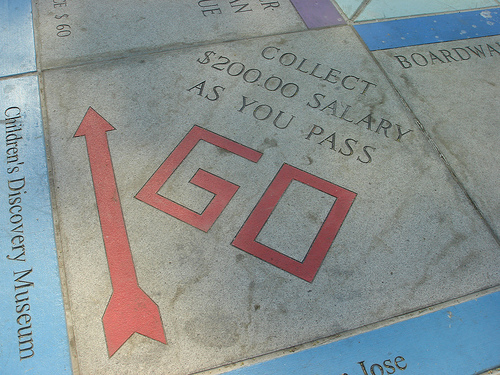‘The book of my enemy has been remaindered / And I am pleased,’ wrote Clive James in his 2003 poem of the same title. Ten years ago, the remainder table was considered a literary backwash. It was reasonable for James to use it as a place to celebrate the failure of a literary foe. But in this last decade? My, how things have changed… ‘If you think that the most dire thing would be to be remaindered, then I’d suggest these days that’s almost an honour,’ wrote Martin Shaw in a recent issue of The Victorian Writer. Shaw is Books Division Manager at Readings. He’s one of the people responsible for choosing which books make it beyond the publisher’s door and onto bookshop shelves. His article was enlightening, and helped me realise that a book in print with a reputable publisher does not alone define success.
Getting your book into bookstores is a major challenge in itself. ‘I would ingest information about several hundred titles in the course of about one and a half to two hours,’ Shaw writes of his monthly sell-in meeting with just one publisher. ‘The simple fact is you’re competing with a whole lot of other hopefuls every month…’ Stores stock just a fraction of the publications offered in the sell-ins (and not all of those stocked actually sell). Of those that fail, a lucky few are remaindered. ‘It’s much more likely that the unsolds will be pulped, that they have no commercial value whatsoever,’ writes Shaw.
Until reading that article, I thought the hoops to be jumped in acquiring a publishing deal were the biggest. Clearly that’s not the case. And once again, I find myself wondering: now that there are alternatives, is print publishing everything it’s cracked up to be?
‘One of the things that’s really different now is that established publishers have lost some of their market power with authors,’ Mark Davis Associate Professor (University of Melbourne) and non-fiction writer (Gangland: Cultural Elites and the New Generationalism) says. He’s looking at authors in the context of both new media, and ongoing changes in the publishing environment (like those outlined in his 2006 article The Decline of the Literary Paradigm in Australian Publishing).
Authors now have choice, says Davis. ‘If I wanted to publish a book ten years ago I needed an agent, I needed a publisher, I needed a contract, I needed someone to tell me how to negotiate that contract, I needed to be able to get my foot in the door, off the slush pile and actually onto someone’s desk. And the reason I had to do that is because publishers had a monopoly.’
The monopoly was over marketing, distribution and even review pages, all of which have been undermined in various ways by new media alternatives. And while publishers are still considered doyens of sorts, it’s not unreasonable for a writer (particularly a new writer) to wonder what a publisher offers over self-publishing options.
An advance of some kind? Well, perhaps not. According to Shaw in some instances advances aren’t offered at all. Royalties? Both avenues offer them, but 70% via Amazon is difficult to match with the 7.5% many authors would get through a publishing house. Marketing efforts? The industry zings with the message that authors must develop their own ‘platforms’ and help drive their own marketing. Distribution? Yes, a publisher can offer that. But given what Shaw tells us about our chances of landing a spot on a bookshelf I wonder how useful that really is. And while harnessing electronic distribution is a major challenge, how advantageous is the printed path in reality today?
As Davis argues, the main thing publishers can offer, ‘is the very thing that publishers have been worst at over the last 20 or 30 years: editing.’ He says that publishers have neglected the substance of books in order to release them quickly (irrespective of whether manuscripts are ready or not). This, combined with downsizing of publishing houses (that are shedding staff) weakens the monopoly further. As Davis says, ‘What’s to stop me self-publishing and just hiring a freelance editor? The same freelancer who might be editing the book if it’s published through [a publishing house]?’
The differences between being published and self-publishing are great, but given the changes to the publishing industry, is one still necessarily better than the other? What's interesting about the current environment is that the monopoly publishers once had, has been eroded by new platforms for authors. As a result Davis says, publishers will need to become more service oriented toward their writers. ‘[Publishers] can no longer take [authors] for granted. That’s a big change.’


